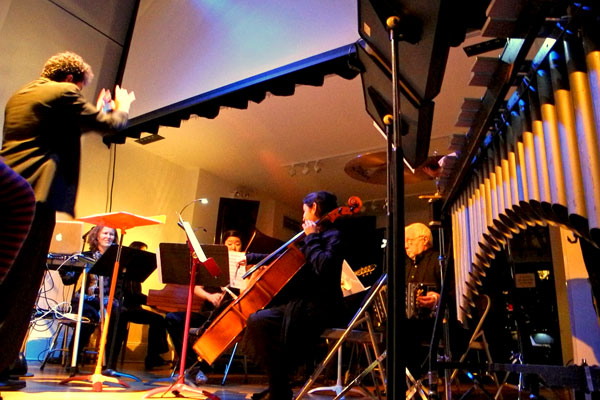
Eduardo Leandro leading members of Ensemble Pi in Kristin Nordeval's "Three Character Studies"
On Saturday Ensemble Pi [Ensemble Π] presented "What Must be Said", its 7th annual Concert for Peace at The Cell, a jewelbox non-profit theater space carved out of the bottom floors of a handsome, early-19th-century Chelsea townhouse. I was delighted to be able to record some images from the concert. By the way, I've decided that the hardest part about photographing performances may be the thing about trying hard not to annoy the rest of the audience.
The evening was one of the most extraordinary and profoundly-moving musical performance events I have ever experienced. The concert was conceived and presented with an intelligence and compassion which intensified the independent merits and beauties of the (seven?) works scheduled. The pieces included were by one writer and three composers all of whose work performed that night, as described by The Cell in its press release, "addresses some of the 'silences' enforced or suggested by governments or the media". All of the works were compelling for their historical and contemporary relevance, brilliant in their composition, and interpreted with consummate elegance by an ensemble which has adopted the most generous of missions.
The collective describes itself as "a socially conscious new music group dedicated to performing the music of living and undiscovered composers", but that description doesn't do justice to the sincerity and bravery of what the group, under its artistic director Idith Meshulam, has been doing for eleven years.
One constant in its programming, perhaps unique among both musical groups and performance venues, is its addressing of serious ideas about which there is not universal consensus even among progressives, and, just as important, the discussion of those ideas. Designed at least partly towards that end are the ensemble's regular collaborations with visual artists, writers, actors, and journalists.
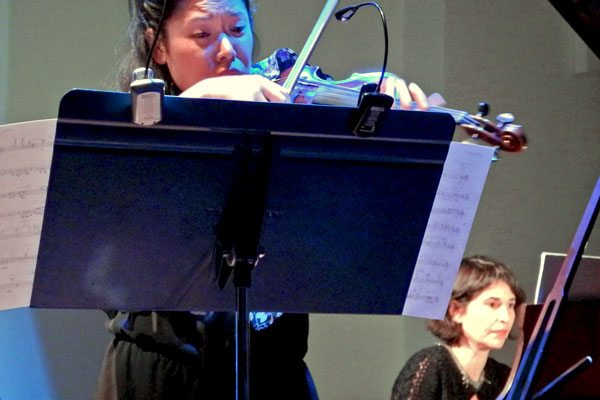
Airi Yoshioka and Idith Meshulam playing Susan Botti's "Fallen City"
On Saturday and Sunday the program began with Susan Botti's "Lament: The Fallen City", for violin and piano, which, the program describes, "reflects upon the fall of Troy as a metaphor for modern cities that have experienced natural or human-made disaster (i.e. Baghdad; New Orleans; Pisco, Peru; or Greensburg, Kansas)". I've never heard some of the kinds of sounds Airi Yoshioka (violin) and Idith Meshulam (piano) were able to produce in this affecting piece, but they were always as eloquent as they were anomalous.
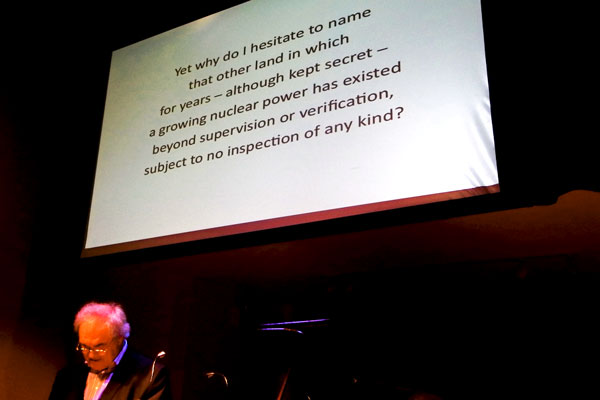
Kai Moser reading Günter Grass' "What Must be Said"
Günter Grass' controversial poem on Israel, Iran and war, "Was gesagt werden muss" [What Must Be Said], from which the evening took its title, was read in German (with an English translation projection) by Kai Moser. Grass has gotten hell for what he wrote, not least because of his earlier, late-life confession that he had been part of an SS tank division (drafted at 17) near the end of the war.

Kristin Nordeval singing "Ask Me", from her "Three Character Studies"
The concert began a transformation into intimate musical theater with the performance of "Three Character Studies", excerpts from composer/soprano Kristin Norderval's opera in progress, "The Trials of Patricia Isasa". Both Emily Donato and Daniel Pincus sang beautifully, Donato in the role of the teenage Isasa, and Daniel Pincus as the federal judge convicted for his role in the torture and kidnapping of many Argentinians, including Isasa. Norderval herself was the superb soloist in the the third section (as the adult Patricia, now a media figure), accompanying herself with some sound processing on her laptop near the end.
This beautiful and very moving piece could be staged as a mini opera on its own right now, and I very much look forward to hearing the completed opera, which will boast a powerful libretto by playwright Naomi Wallace.

a scene from An den kleinen Radioapparat [to the little radio]
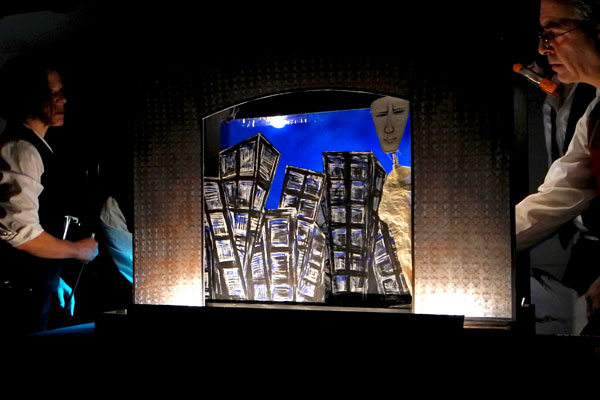
from Und es sind die finstern Zeiten in der fremden Stadt [the times are dark and fearful]
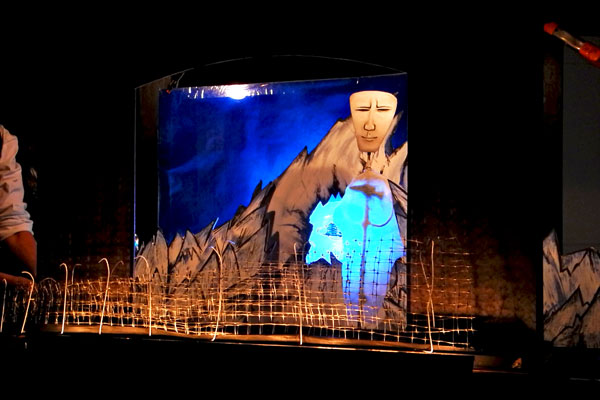
the concluding, concentration camp scene, Harte Menschheit, unbewegt, lang erfror'nem Fischvolk gleich [people hard and impassive, like fishermen long at sea]
The evening continued with the premiere of "Eisler on the Go", a beautiful, animated puppet show by the New York collaborative, Great Small Works, on the life of Hanns Eisler. The composer's studiedly-accessible music, his personality and his loyalties, his proletarian activism, and his sad fate (beginning long before he was expelled from the U.S. as a communist), has been something of an obsession for me ever since I first came across his music and his story a number of years ago; I'm very happy to find lately that his fans are now becoming legion.
The tiny-theater show animated three of the most familiar of Eisler's many songs, each sung by Nordeval. They were: "Song von Angebot und Nachfrage", "An den kleinen Radioapparat", and "Und es sind die finstern Zeiten in der fremden Stadt" [the links are to three awesome videos, with three very different performers; enjoy].
After the Puppenspiel Meshulam played the first movement of the composer's "Piano Sonata No. 3" and his "Klavierstück Op. 32 no V and VI", gently bringing the chamber back from the darkness, the anger and the funk - brilliantly.
The program was repeated the following night.
